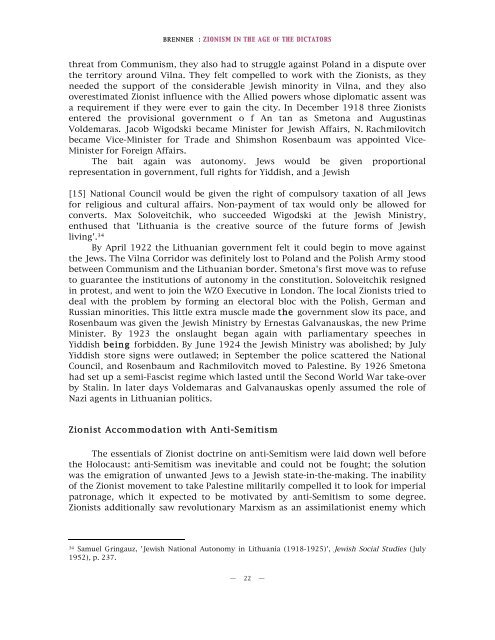Create successful ePaper yourself
Turn your PDF publications into a flip-book with our unique Google optimized e-Paper software.
BRENNER : <strong>ZIONISM</strong> <strong>IN</strong> <strong>THE</strong> <strong>AGE</strong> <strong>OF</strong> <strong>THE</strong> <strong>DICTATORS</strong><br />
threat from Communism, they also had to struggle against Poland in a dispute over<br />
the territory around Vilna. They felt compelled to work with the Zionists, as they<br />
needed the support of the considerable Jewish minority in Vilna, and they also<br />
overestimated Zionist influence with the Allied powers whose diplomatic assent was<br />
a requirement if they were ever to gain the city. In December 1918 three Zionists<br />
entered the provisional government o f An tan as Smetona and Augustinas<br />
Voldemaras. Jacob Wigodski became Minister for Jewish Affairs, N. Rachmilovitch<br />
became Vice-Minister for Trade and Shimshon Rosenbaum was appointed Vice-<br />
Minister for Foreign Affairs.<br />
The bait again was autonomy. Jews would be given proportional<br />
representation in government, full rights for Yiddish, and a Jewish<br />
[15] National Council would be given the right of compulsory taxation of all Jews<br />
for religious and cultural affairs. Non-payment of tax would only be allowed for<br />
converts. Max Soloveitchik, who succeeded Wigodski at the Jewish Ministry,<br />
enthused that 'Lithuania is the creative source of the future forms of Jewish<br />
living'. 34<br />
By April 1922 the Lithuanian government felt it could begin to move against<br />
the Jews. The Vilna Corridor was definitely lost to Poland and the Polish Army stood<br />
between Communism and the Lithuanian border. Smetona's first move was to refuse<br />
to guarantee the institutions of autonomy in the constitution. Soloveitchik resigned<br />
in protest, and went to join the WZO Executive in London. The local Zionists tried to<br />
deal with the problem by forming an electoral bloc with the Polish, German and<br />
Russian minorities. This little extra muscle made the government slow its pace, and<br />
Rosenbaum was given the Jewish Ministry by Ernestas Galvanauskas, the new Prime<br />
Minister. By 1923 the onslaught began again with parliamentary speeches in<br />
Yiddish being forbidden. By June 1924 the Jewish Ministry was abolished; by July<br />
Yiddish store signs were outlawed; in September the police scattered the National<br />
Council, and Rosenbaum and Rachmilovitch moved to Palestine. By 1926 Smetona<br />
had set up a semi-Fascist regime which lasted until the Second World War take-over<br />
by Stalin. In later days Voldemaras and Galvanauskas openly assumed the role of<br />
Nazi agents in Lithuanian politics.<br />
Zionist Accommodation with Anti-Semitism<br />
The essentials of Zionist doctrine on anti-Semitism were laid down well before<br />
the Holocaust: anti-Semitism was inevitable and could not be fought; the solution<br />
was the emigration of unwanted Jews to a Jewish state-in-the-making. The inability<br />
of the Zionist movement to take Palestine militarily compelled it to look for imperial<br />
patronage, which it expected to be motivated by anti-Semitism to some degree.<br />
Zionists additionally saw revolutionary Marxism as an assimilationist enemy which<br />
34 Samuel Gringauz, 'Jewish National Autonomy in Lithuania (1918-1925)', Jewish Social Studies (July<br />
1952), p. 237.<br />
— 22 —


